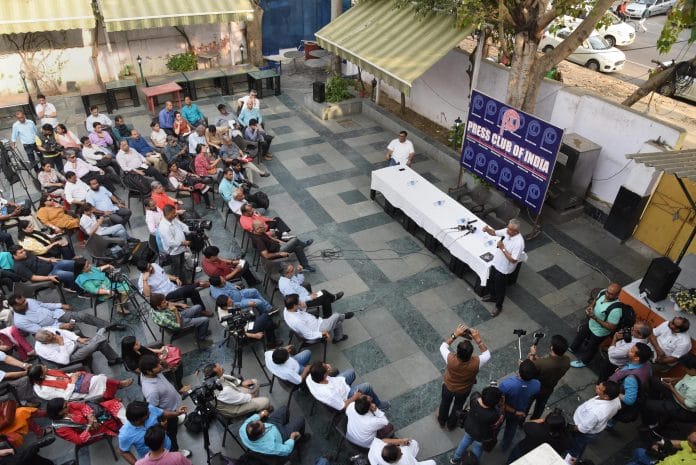No formal requirements exist for education or training in journalism despite the wide repercussions misdemeanours of unethical scribes can have on the society at large.
As it directed the ministry of information & broadcasting to withdraw its controversial fake-news order, the Prime Minister’s Office (PMO) said issues pertaining to fake news should only be addressed by the Press Council of India (PCI).
The PCI, the watchdog of print media, is governed by the Press Council Act, 1978, which aims at preserving the freedom of the press and improving the standards of newspapers and news agencies in India. The council has the power to draft a code of conduct for newspapers, news agencies and journalists, and is vested with the responsibility to ensure newspapers function in a manner that doesn’t compromise public interest.
The 11 functions listed in Section 13(2) of the Act give the PCI the status of an arbiter in the arena of freedom of speech and press. But it lacks teeth, i.e. penal provisions, to be effective.
In contrast, the Medical Council of India, which regulates medical education and practice, and the Bar Council of India, to regulate legal professionals, enjoy a variety of effective powers to fulfil their brief.
Aspirants have to register with the councils to practice either profession. There is a specified period of apprenticeship. The councils are a bulwark against holders of bogus degrees passing off as professionals in the two fields.
Left to its own devices
No such formal requirements exist for education or training in journalism, despite the wide repercussions misdemeanours of unethical scribes can have on the society at large.
In our economically integrated world, fake news can lose investors millions of dollars across the globe. A journalist is an actor in the public domain locally, nationally as well as globally. He or she gathers information and disseminates it to the public at large. At the same time, they are expected to monitor public opinion via reviews and comments, and thereby promote debate, which is the sine qua non of a democracy.
The society expects a higher degree of loyalty and responsibility from journalists. They are expected to have a wider knowledge and a holistic view of public affairs. Therefore, more than formal education or training, a journalist should have scholarship, the right attitude, and a sense of dedication. Several universities have started courses in journalism. Whether a formal qualification should be made a legal requirement for the field is an open-ended question, but it bears notice that, unlike the MCI and BCI, the PCI doesn’t have any power to prescribe educational standards for journalists.
There is also no provision in India for the formal registration of journalists. The Central Press Accreditation Committee has framed rules for accreditation, but the accreditation given to a journalist is for working in a particular newspaper or news agency. Freelance journalists do not require any accreditation.
France, for example, has a system for the registration of journalists, and doing so gets scribes many benefits, like an income tax concession. Professional journalists are obligated to secure a licence from Commission de la Carte d’Identité des Journalistes Professionnels, also known as the ‘press card commission’.
The call for revamp
The PCI needs a revamp in its structure, composition as well as jurisdiction.
For one, a wider section of society needs to find representation in the commission. The press interacts with the public at large every day, and members from outside the field of journalism will make it more vibrant and democratic.
Secondly, while the BCI and the state bar councils as well as the MCI have the power to sack a member of the profession for misconduct or violation of ethics, all the PCI can do is warn or censure an erring journalist. The absence of such a power clearly shows Parliament intended the PCI to function as an ombudsman.
In England, the Press Council was replaced with the Press Complaints Commission in 1991. But the media’s self-regulatory agency shut down in 2014 following criticism of its response to the phone-hacking scandal. In the US too, except for the states of Minnesota and Hawaii, the mechanism of press council has proved a failure.
A study on the need for a regulatory authority for the press (David Pritchard, ‘The Impact of Newspaper Ombudsmen on Journalists’ Attitudes’, 1993, Journalism Quarterly) concluded that news councils and newspapers’ ombudsmen were not effective.
However, it is time Parliament instituted a joint media council, covering print, electronic as well as social media, to preserve and maintain standards in journalism and media institutions. The Act guiding the organisation, however, must protect the right to reputation and dignity, and at the same time strike a balance between the freedom of media and speech on the one hand, and right to know on the other.
(The author is a member of Law Commission of India, an expert on press law, and author of the book, Press and the Journalists: Watchdog to Guidedog. Views expressed are personal)






